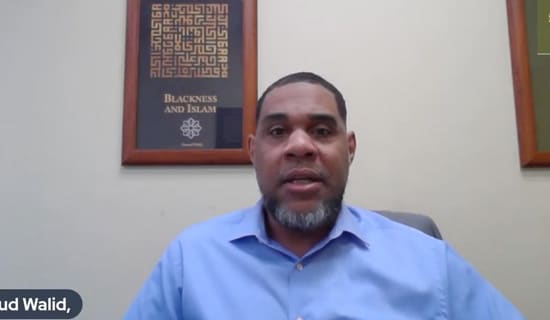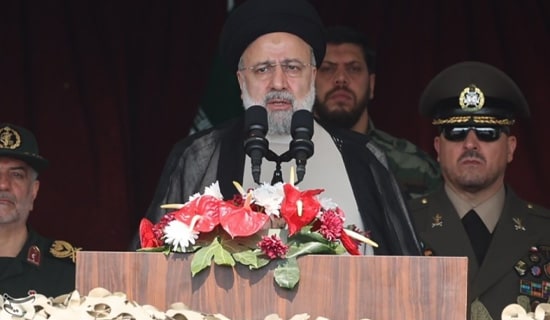The London daily Al-Sharq Al-Awsat published an op-ed on May 27, 2009, titled "Will [Lebanon] Be a Hassan Nasrallah State?" by Egyptian liberal Dr. 'Abd Al-Mun'im Sa'id, director of the Al-Ahram Center for Strategic Studies. Sa'id wrote that although Nasrallah has succeeded in creating a state within a state inside Lebanon, he will not be able to run the country - because revolutionary leaders like him and like Yasser Arafat are incapable of administering a state.
Following are excerpts from the article:
Arafat Failed to Realize that, In a State, There Can Be Only One Authority with the Right to Bear Arms
"When Chairman Yasser Arafat was about to return to Palestine to implement the Gaza-Jericho Agreement, as a first step towards establishing a Palestinian state, many wondered whether he could run a state at all, and whether the PLO would be capable of transforming [itself] from a revolutionary movement in exile into a political entity that governs a people and administers institutions... This was a legitimate question, because national liberation in Third World countries has not always proceeded in a praiseworthy manner; in fact, it has seen more failures than successes. [This is because] great fighters have never been the best administrators...
"However, Arafat at the time did not see this question as legitimate. His answer [to the question] was that the PLO had succeeded in administrating an entire country - namely, Lebanon - for many years, so why wouldn't it be able to administer Gaza and Jericho, or a Palestinian state, whatever its size?
"This answer from Arafat frustrated two groups of people. First, [all] those who understood [from it] that Arafat did not know what it meant to run a state. The second was the Lebanese, who were offended by it, because they never realized that they had been living under Palestinian colonialism ever since they had espoused the Palestinian cause.
"In any event, it soon became clear that Mr. Yasser Arafat [indeed] had no idea what a state meant or what it meant to run one. First of all, he failed to realize what [all] states have known throughout history - namely that there must be one [and only one] authority with the right to bear arms… The result was a rapid proliferation of armed Palestinian groups, including numerous left-wing groups and various Islamist groups. Even the Fatah armed forces were split into several groups. Each of these [militias] had its own way of liberating Palestine and defending its security, and of making decisions on matters of war and peace, according to the [instructions of its particular] leadership inside [Palestine] and abroad."
The Palestinian Treasury, Under Arafat's Control, Distributed Funds to His Helpers and Cronies
SUPPORT OUR WORK

"In addition, even before a state was established, Arafat [decided] to compensate the [Palestinian] fighters for their long years of struggle in exile. The Palestinian treasury, which was under his control… distributed the [international] aid funds among [Arafat's] helpers and cronies. This is how the issue of 'Palestinian corruption' became one of the problems plaguing the Palestinian cause, [and became a concern for] the E.U., the U.N., the countries that grant aid [to the Palestinians], and even the U.S. Council on Foreign Relations…
"This policy of Arafat's had disastrous results. It gave Israel an opportunity to denounce the struggle of the Palestinian people, and to shirk its commitments - while the Palestinian people found itself... facing repeated rounds of war with its land [gradually] being eaten up by [Israeli] settlements…"
After Hamas Failed at Running the PA, It Had No Choice but to Secede from a State that Has Not Even Been Founded Yet
"[To make things worse, in 2006] the armed movement of Hamas, which had been running [its own] foreign policy from the opposition, won the Legislative Council elections and began to manage [the Palestinian foreign policy] directly. When, just like Yasser Arafat, it failed at running [the country], it had no choice but to secede from the [Palestinian] state that has not even been established yet. It tore the Gaza Strip away from the West Bank, and started to manage its own government, its own wars, and its own resistance."
Hizbullah Has Come a Long Way Towards Taking Over Lebanon; Now It Wants to Turn May 7, the Day of Its Takeover of Beirut, into a National Holiday
"What prompted me to write this article was the declarations made by Sheikh Hassan Nasrallah on May 15 [2009], namely that May 7 was a glorious day in Lebanese history, and that 'the minds, the souls, and the resolve that defeated the strongest army in the region [i.e. the Israeli army], which is supported by the strongest army in the world [i.e. the U.S. military], are capable of running a country 100 times larger than Lebanon.'
"For those not in the know, May 7, [2008] was the day on which the Hizbullah forces entered Beirut in a great show of force, attacked the offices of [political] parties, TV stations, and newspapers, and declared loud and clear that Hizbullah is not [merely] a state within the Lebanese state - rather, it is the Lebanese state itself.
"As a matter of fact, this is not far from the truth… Hizbullah has indeed come a long way towards taking control of Lebanon.... Alongside its arms, it has acquired [its own] intelligence apparatuses and [its own] foreign relations, and with all this came also control over territory. The whole of South Lebanon and the southern part of Beirut have become the new Hizbullah state within Lebanon.
"[What happened in Lebanon] is not much different from what happened in Palestine. The difference is that Hamas did what it did [i.e. took over Gaza] before a Palestinian state has even come into being, whereas Hizbullah did what it did [i.e. took over Lebanon] despite the existence of the [Lebanese] state, which as a result has begun to fall apart. [At some point,] Hizbullah groups started to take control of the [Beirut] airport, [including] the passport department, so that the organization could obtain the passports and visas it needs for its operations…
"The majority in the Lebanese government demanded that Hizbullah's transgressions at the airport be stopped - but the result was that Hizbullah occupied all of Beirut, and an atmosphere of civil war permeated the entire country. Since no-one in Lebanon wanted to re-experience the horrors of [civil] war, they [all] agreed, with Qatari mediation, to give Hizbullah a power of veto over [government] decisions - what came to be known as the 'obstructing third,' which allows Hizbullah to veto any [government] decision it does not like…"
The HizbullahState Is an IranianOutpostState on Lebanese Soil
"This is how the Hizbullah state was born within the Lebanese state. [Once this happened,] it became necessary to turn [May 7,] the day of the Beirut takeover, into a national holiday marking the birthday of this state. Those who watch Hizbullah's TV channel, Al-Manar, have seen the kind of celebrations that Hizbullah wants: hundreds of thousands of Hizbullah supporters gather, wave their fists in the air in front of the TV cameras and make gestures in unison - the kind [of behavior] you see only in fascist parties. They applaud Sheikh Hassan Nasrallah, but before that [they applaud] Ayatollah Khomeini, the founder of the Islamic revolution in Iran, and Iranian Supreme Leader Ali Khamenei.
"You might be puzzled to find pictures and flags of Iranian leaders, and to hear cheers for these leaders, at a purely Lebanese celebration - but you will ultimately understand that what we are facing is an Iranian outpost state on Lebanese soil.
"Soon, elections will be held in Lebanon in the shadow of Hizbullah's guns, under the direct pressure of its militias and political [institutions], and under the [slogan] of resisting the Zionist-American alliance [against] Lebanon…
"[The pertinent issue at the moment is] Hassan Nasrallah's ability to administer a state... for the leadership [style] of Hassan Nasrallah is not much different than that of Yasser Arafat. [Movements in which members] have no will of their own but work according to guidelines of absolute obedience, and are steeped with ecstatic, [almost] mystical, adoration for their leader, cannot lead a state, let alone lead it towards progress and prosperity."




